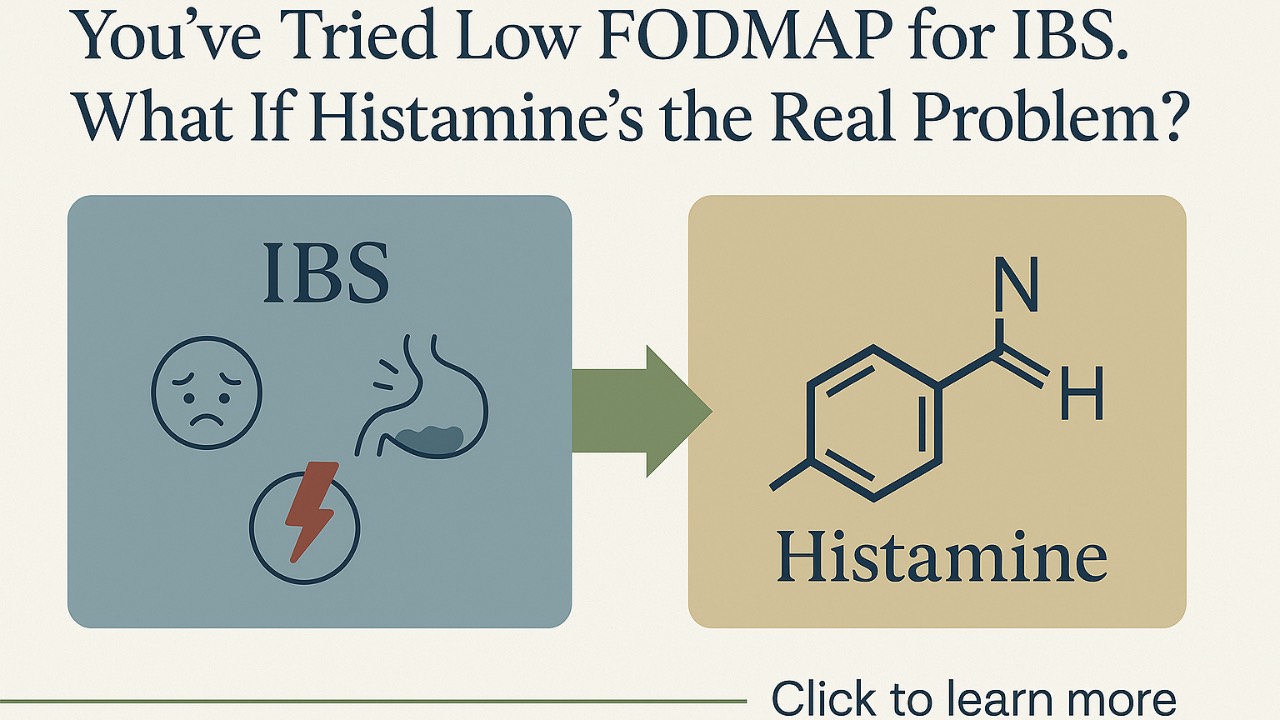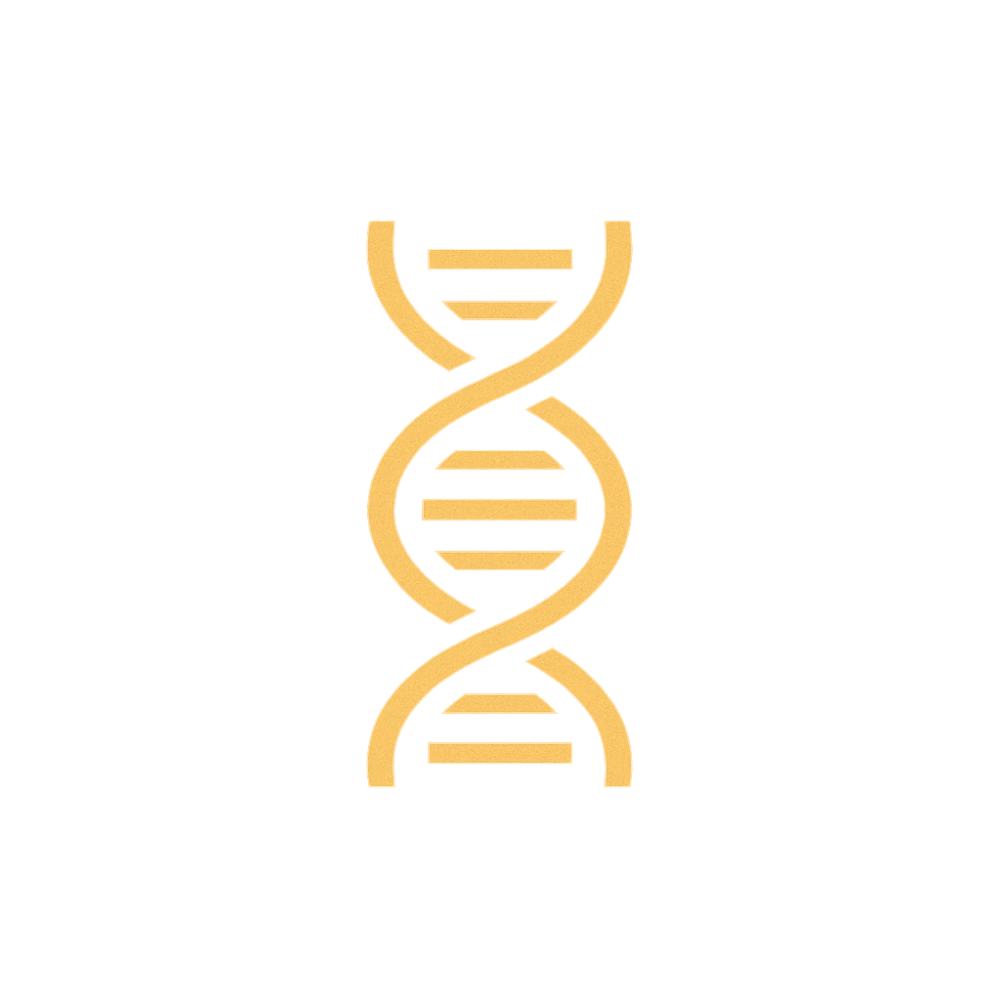You’ve Tried Low FODMAP for IBS. What If Histamine’s the Real Problem?
May 04, 2025
When Low FODMAP Isn’t the Full Answer and Why You Should Consider Histamine
You’ve done the thing.
Cut onions. Nixed garlic. Swapped apples for bananas and smiled politely at plain chicken and rice for weeks. Maybe even months. And maybe… it helped. A bit. The bloating dipped for a while. The urgency wasn’t as bad. You finally got a few decent nights of sleep.
But then the flare-ups crept back in. Or shifted. And now you’re back to asking, why is my gut still so reactive when I’ve followed the plan?
If you’ve made it through the full low FODMAP protocol and you’re still feeling off, bloated, wired, itchy, irritable, it might be time to look in a different direction. Not away from digestion. But deeper.
For some people, it’s not just fermentable carbs.
It’s histamine and the way your body processes (or doesn’t process) it.
Symptoms That Seem Like IBS… But Might Be Histamine Intolerance
Histamine reactions don’t always follow the classic “allergy” script.
They’re sneakier. Messier. And they tend to overlap with IBS in ways that leave you second-guessing everything.
Here’s what that can look like:
- Bloating that shows up mid-cycle, even if your diet’s been clean
- Flushing or irritation after wine, chocolate, or even sauerkraut
- Loose stools that seem tied to poor sleep—or nothing at all
- Waking up around 2 or 3 a.m. with a racing heart and heat in your chest
- Itching after workouts, or weird mood swings post-exercise
- Migraines and gut cramping that arrive as a package deal
- Supplements with methyl B12 or folate making you more anxious, not less
And here’s the tough part: many of the things you’re told will help... like high-dose B vitamins or digestive enzymes can actually make it worse, if histamine’s the issue. Sometimes, trying harder just backfires.
Why Histamine Intolerance Is Often Missed in Gut Health Workups
Histamine intolerance isn’t about the food itself. It’s about your body’s capacity to break down histamine once it’s in your system.
Think of it less like an allergy and more like a traffic jam. A bottleneck.
You’ve got two key enzymes helping manage the load:
- DAO (diamine oxidase): works in the gut to clear histamine from food
- HNMT (histamine-N-methyltransferase): works in the brain and cells
If either (or both) of those systems is sluggish, histamine lingers longer than it should. Add in slow methylation, fast MAOA activity, and a little stress (or hormone fluctuation), and it’s not hard to overwhelm the system.
Estrogen, by the way, ramps histamine up. And inflammation? It slows clearance down. So the gut-brain-hormone triangle here is… complicated.
Genetic Factors That Make Some People More Sensitive
This isn’t about having flawed genes. Not even close.
But certain variants can make you more prone to reactivity, especially when your environment is adding load.
Here’s the short list:
DAO
If you’re genetically low in DAO, you’ll struggle with histamine from food. It might not be dramatic, but just enough to keep your gut constantly “on edge.”
HNMT
If this gene is slow, you might feel agitated, overstimulated, or emotionally flooded after meals or late at night when you should be winding down.
MAOA
Fast MAOA can deplete calming neurotransmitters too quickly. Slow MAOA lets histamine linger. Neither one feels great in the long run.
MTHFR, MTRR
These genes regulate methylation, the system that helps detox, stabilize, and keep histamine in check. If you’ve ever felt worse after a “mood support” supplement, this might be why.
Bottom line: it’s not just the food. It’s how your body processes what comes after.
Why the Low FODMAP Diet Isn’t Always Enough
Here’s something that doesn’t get talked about enough:
Many high-histamine foods are actually low FODMAP.
Spinach. Tomatoes. Vinegar. Cured meats.
All “safe” on a gut-friendly plan… but potentially aggravating if your histamine system is overloaded.
That’s why people often feel 50% better on low FODMAP, but never truly stable. There’s a piece missing.
And hormones? They amplify everything. Especially estrogen. That’s why symptoms often spike premenstrually even if your diet hasn’t changed.
Histamine Clues Hiding in Plain Sight
Sometimes the best insights come from patterns, not isolated symptoms.
You might be dealing with histamine intolerance if:
- Symptoms flare when you’re tired, stressed, or haven’t slept well
- Probiotics make your digestion worse, not better
- You feel bloated within 10 minutes of eating, not hours later
- Your gut feels jittery, not just sluggish or heavy
- Supplements cause odd side effects like flushing, buzzing, or wired exhaustion
You don’t need to check every box. But enough of these in a row? It’s worth considering histamine as a layer.
Supporting Histamine: What Works Beyond Food Lists
Avoiding leftovers and aged cheese is fine. But it’s not a plan, it’s a pause.
Here’s where deeper support can make a real difference:
- Ease up on enzymes if they make you feel worse. Especially betaine HCl or bile salts.
- Try magnesium threonate or glycinate to help calm nervous system overload.
- Broccoli sprouts and calcium D-glucarate can support estrogen detox—after histamine is managed.
- Switch methylated B vitamins to hydroxo B12 and folinic acid if you’re sensitive.
- Cool gut inflammation with things like aloe, cucumber smoothies, or just slowing down and not rushing meals.
Yes, that last one matters. DAO gets burned out when the system’s constantly in high-alert mode. Nervous system pacing is real support.
Genetic Testing Can Bring Clarity (Not Just Curiosity)
This isn’t about diagnosis. It’s about insight.
When you know your status on genes like DAO, HNMT, MTHFR, and MAOA, things start making sense. You can finally see the why behind your reactions.
I use MaxGen Labs’ The Works Panel because it includes all these and more.
If you’re curious, this is the one I use in practice.
→ Learn more about The Works Panel here
You’re Not Imagining It. You Just Didn’t Have the Right Map Yet.
There’s a particular kind of mental fatigue that comes from doing everything right… and still feeling like your body’s on edge.
IBS is real. So is histamine intolerance. And in many cases, they’re tangled together in ways no elimination diet alone can fix.
Low FODMAP helps some people a lot.
But for others? It’s like solving half the puzzle.
When the histamine system gets the support it needs, things start to quiet down. The bloating shifts. The urgency eases. The sleep deepens. You stop second-guessing every bite.
That’s not a miracle.
It’s just biology, finally working with you instead of against you.
If you’re ready to explore this deeper, browse more of the blog, here or reach out. The pieces are here. Let’s find the ones that fit for you.


